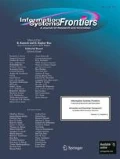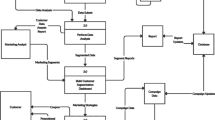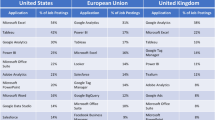Abstract
Crowdsourcing has become an increasingly attractive practice for companies to abstain on-demand workforce and higher level of flexibility in open contexts. While knowledge-intensive crowdsourcing is expected to be prosperous, most current crowdsourcing calls are still about general and low-priced tasks. An obstacle of conducing knowledge-intensive crowdsourcing is the lack of diversity of expertise and the small scale of crowd in isolated crowdsourcing marketplaces. In this paper, a network of crowdsourcing marketplaces is envisioned for efficient knowledge-intensive crowdsourcing and engagement of massive and diverse participants across different marketplaces. Based on an algorithm for estimating participants for knowledge-intensive crowdsourcing tasks, an experiment with 100 simulations indicates that conducting crowdsourcing tasks in a network of crowdsourcing marketplaces results in higher customer satisfaction than doing that in isolated marketplaces. This finding advocates the development of a network of crowdsourcing marketplaces to open up the potential of knowledge-intensive crowdsourcing.




Similar content being viewed by others
References
Abascal-Mena, R., López-Ornelas, E., Zepeda-Hernández, J. S., Gómez-Torrero, B. E., León-Martagón, G., & Morales-Franco, H. (2014). Worker-community: using crowdsourcing to link informal workers with potential clients. Paper presented at the the 6th International Conference on Social Computing and Social Media, Heraklion, Crete, Greece,
Afuah, A., & Tucci, C. L. (2012). Crowdsourcing as a solution to distant search. Academy of Management Review, 37(3), 355–375.
Alavi, M., & Leidner, D. E. (2001). Review: knowledge management and knowledge management systems: conceptual foundations and research issues. MIS Quarterly, 25(1), 107–136.
Brabham, D. C. (2008). Crowdsourcing as a model for problem solving. Convergence: The International Journal of Research into New Media Technologies, 14(1), 75–90.
Chen, M.-F. (2004). Combining grey relation and TOPSIS concepts for selecting an expatriate host country. Mathematical and Computer Modelling, 40(13), 1473–1490.
Corvello, V., & Iazzolino, G. (2013). Factors affecting the practices of external problem solvers in broadcast search. Journal of Technology Management & Innovation, 8(2), 166–177.
Deng, J. (1989). Introduction to grey system. Journal of Grey System, 1(1), 1–24.
Diamond, P. A. (1982). Aggregate demand management in search equilibrium. Journal of Political Economy, 90(5), 881–894.
Difallah, D. E., Catasta, M., Demartini, G., Ipeirotis, P. G., & Cudré-Mauroux, P. (2015). The dynamics of micro-task crowdsourcing: the case of Amazon MTurk. Paper presented at the the 24th International Conference on World Wide Web, Florence, Italy
Ford, R. C., Richard, B., & Ciuchta, M. P. (2015). Crowdsourcing: a new way of employing non-employees? Business Horizons, 58(4), 377–388.
Garrigos-Simon, F. J., Alcamí, R. L., & Ribera, T. B. (2012). Social networks and Web 3.0: their impact on the management and marketing of organizations. Management Decision, 50(10), 1880–1890.
Garrigos-Simon, F. J., & Narangajavana, Y. (2015). From crowdsourcing to the use of masscapital: the common perspective of the success of Apple, Facebook, Google, Lego, TripAdvisor, and Zara. In F. J. Garrigos-Simon, I. Gil-Pechuán, & S. Estelles-Miguel (Eds.), Advances in crowdsourcing (pp. 1–13). Switzerland: Springer.
Gefen, D., Gefen, G., & Carmel, E. (2015). How project description length and expected duration affect bidding and project success in crowdsourcing software development. Journal of Systems and Software.
Geiger, D., & Schader, M. (2014). Personalized task recommendation in crowdsourcing information systems — current state of the art. Decision Support Systems, 65, 3–16.
Gong, Y. (2015). Enabling flexible IT services by crowdsourcing: a method for estimating crowdsourcing participants. In M. Janssen (Ed.), Open and big data management and innovation (Lecture Notes in Computer Science, Vol. 9373): Springer.
Gong, Y., & Janssen, M. (2012). From policy implementation to business process management: principles for creating flexibility and agility. Government Information Quarterly, 29(1), 61–71.
Guittard, C., Schenk, E., & Burger-Helmchen, T. (2015). Crowdsourcing and the evolution of a business ecosystem. In F. J. Garrigos-Simon, I. Gil-Pechuán, & S. Estelles-Miguel (Eds.), Advances in crowdsourcing (pp. 49–60). Switzerland: Springer.
Heimerl, K., Gawalt, B., Chen, K., Parikh, T. S., & Hartmann, B. (2012). Communitysourcing: engaging local crowds to perform expert work via physical kiosks. Paper presented at the The ACM SIGCHI Conference on Human Factors in Computing Systems, Austin, Texas, USA.
Howe, J. (2006), The rise of crowdsourcing. Wired Magazine.
Hwang, C.-L., & Yoon, K. (1985). Multiple attribute decision making: methods and applications a state-of-the-art survey (Lecture Notes in Economics and Mathematical Systems): Springer-Verlag.
IEEE (1990). Interoperability. IEEE standard computer dictionary: a compilation of IEEE standard computer glossaries. New York, USA: Institute of Electrical and Electronics Engineers.
Jamali, R., & Tooranloo, H. S. (2009). Prioritizing academic library service quality indicators using fuzzy approach: case study: libraries of Ferdowsi university. Library Management, 30(4/5), 319–333.
Janssen, M., Estevez, E., & Janowski, T. (2014). Interoperability in big, open, and linked data--organizational maturity, capabilities, and data portfolios. Computer, 47(10), 44–49.
Jeppesen, L. B., & Lakhani, K. R. (2010). Marginality and problem solving effectiveness in broadcast search. Organization Science, 21(5), 1016–1033.
Kittur, A., Nickerson, J. V., Bernstein, M. S., Gerber, E. M., Shaw, A., Zimmerman, J., et al. (2013). The Future of Crowd Work. Paper presented at the The 16th ACM Conference on Computer Supported Cooperative Work and Social Computing (CSCW 2013), San Antonio, Texas, USA.
Lakhani, K. R. (2013). Using the crowd as an innovation partner. Harvard Business Review, 91(4), 60–69.
Lin, M.-C., Wang, C.-C., Chen, M.-S., & Chang, C. A. (2008). Using AHP and TOPSIS approaches in customer-driven product design process. Computers in Industry, 59(1), 17–31.
Lu, B., Hirschheim, R., & Schwarz, A. (2015). Examining the antecedent factors of online microsourcing. Information Systems Frontiers, 17(3), 601–617.
Mahr, D., Rindfleisch, A., & Slotegraaf, R. J. (2015). Enhancing crowdsourcing success: the role of creative and deliberate problem-solving styles. Customer Needs and Solutions, 2(3), 209–221.
Majchrzak, A., & Malhotra, A. (2013). Towards an information systems perspective and research agenda on crowdsourcing for innovation. Journal of Strategic Information Systems, 22(4), 257–268.
Mortensen, D. T. (2011). Markets with search friction and the DMP model. The American Economic Review, 101(4), 1073–1091.
Nevo, D., & Kotlarsky, J. (2014). Primary vendor capabilities in a mediated outsourcing model: can IT service providers leverage crowdsourcing? Decision Support Systems, 65, 17–27.
Ngai, E. W. T., & Chan, E. W. C. (2005). Evaluation of knowledge management tools using AHP. Expert Systems with Applications, 29(4), 889–899.
Oztaysi, B. (2014). A decision model for information technology selection using AHP integrated TOPSIS-Grey: The case of content management systems. Knowledge-Based Systems, 70, 44–54.
Patil, S. K., & Kant, R. (2014). A fuzzy AHP-TOPSIS framework for ranking the solutions of Knowledge Management adoption in Supply Chain to overcome its barriers. Expert Systems with Applications, 41(2), 679–693.
Pissarides, C. A. (2011). Equilibrium in the labor market with search frictions. The American Economic Review, 101(4), 1092–1105.
Roy, S. B., Lykourentzou, I., Thirumuruganathan, S., Amer-Yahia, S., & Das, G. (2015). Task assignment optimization in knowledge-intensive crowdsourcing. The VLDB Journal, 24(4), 467–491.
Saaty, T. L. (1980). The analytic hierarchy process: planning, priority setting, resource allocation (Decision Making Series): Mcgraw-Hill.
Satzger, B., Psaier, H., Schall, D., & Dustdar, S. (2013). Auction-based crowdsourcing supporting skill management. Information Systems, 38(4), 547–560.
Schall, D., Satzger, B., & Psaier, H. (2014). Crowdsourcing tasks to social networks in BPEL4People. World Wide Web, 17(1), 1–32. doi:10.1007/s11280-012-0180-6.
Sekhar, C., Patwardhan, M., & Vyas, V. (2015). A delphi-AHP-TOPSIS based framework for the prioritization of intellectual capital indicators: a SMEs perspective. Procedia - Social and Behavioral Sciences, 189, 275–284.
Slivkins, A., & Vaughan, J. W. (2013). Online decision making in crowdsourcing markets: theoretical challenges. ACM SIGecom Exchanges, 12(2), 4–23.
Sommer, R. A. (2003). Business process flexibility: a driver for outsourcing. Industrial Management & Data Systems, 103(3), 177–183.
Thuan, N. H., Antunes, P., & Johnstone, D. (2016). Factors influencing the decision to crowdsource: a systematic literature review. Information Systems Frontiers, 18(1), 47–68.
Vakharia, D., & Lease, M. (2015). Beyond AMT: an analysis of crowd work platforms. Paper presented at the iConference 2015, Newport Beach, CA, USA.
Williamson, O. E. (2002). The theory of the firm as governance structure: from choice to contract. The Journal of Economic Perspectives, 16(3), 171–195.
Yang, J., Bozzon, A., & Houben, G.-J. (2015). Knowledge crowdsourcing acceleration. Paper presented at the the 15th International Conference on Web Engineering (ICWE 2015), Rotterdam, the Netherlands
Yuen, M.-C., King, I., & Leung, K.-S. (2015). TaskRec: a task recommendation framework in crowdsourcing systems. Neural Processing Letters, 41, 223–238.
Zenger, T., Felin, T., & Bigelow, L. S. (2011). Theories of the firm-market boundary. Academy of Management Annals, 5(1), 89–133.
Zhao, Y., & Zhu, Q. (2014). Evaluation on crowdsourcing research: current status and future direction. Information Systems Frontiers, 16(3), 417–434.
Acknowledgments
This work is supported by the National Natural Science Foundation of China (Grand No. 71501145).
Author information
Authors and Affiliations
Corresponding author
Rights and permissions
About this article
Cite this article
Gong, Y. Estimating participants for knowledge-intensive tasks in a network of crowdsourcing marketplaces. Inf Syst Front 19, 301–319 (2017). https://doi.org/10.1007/s10796-016-9674-6
Published:
Issue Date:
DOI: https://doi.org/10.1007/s10796-016-9674-6




